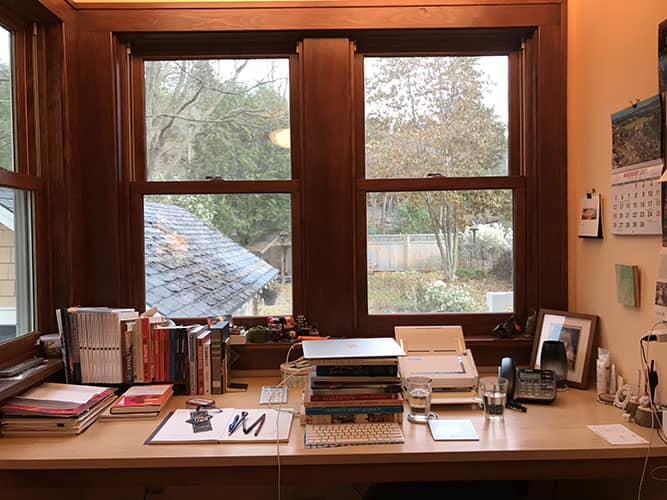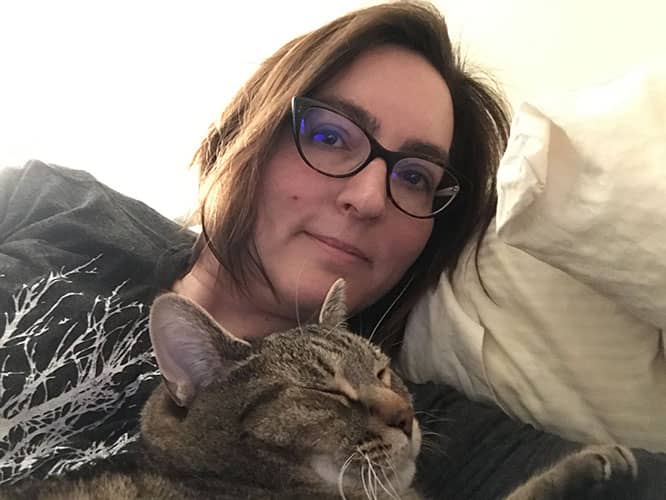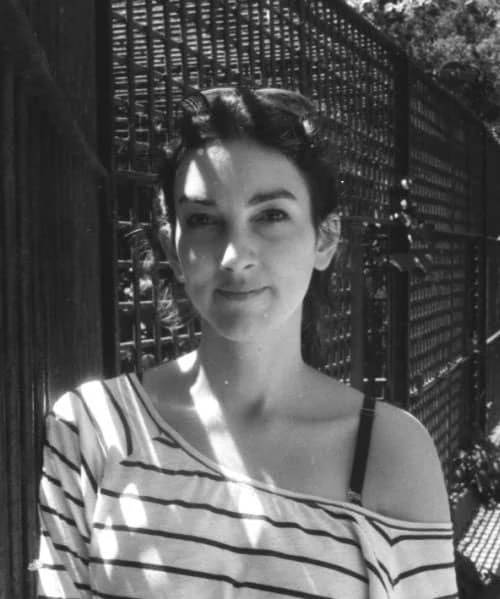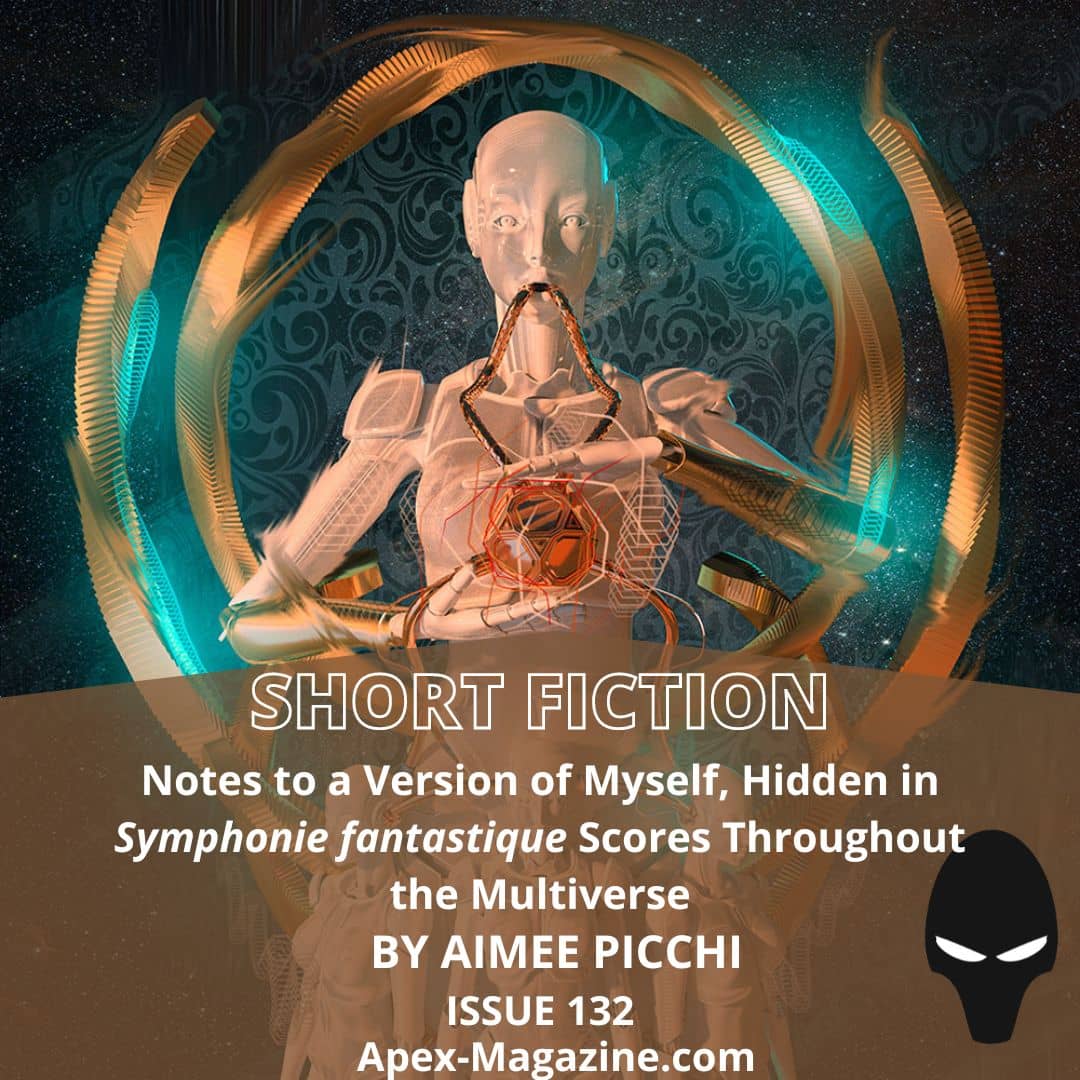
Sometimes you pull a story from the submission pile and start reading, and time disappears, and suddenly you’re back in your own reality feeling a little changed like you’ve returned from someplace else. This is what it was like to read “Notes to a Version of Myself, Hidden in Symphonie Fantastique Scores Throughout the Multiverse” by Aimee Picchi for the first time. It’s the kind of reading experience we first readers live for, and I couldn’t usher the story up to Lesley fast enough. If you haven’t read the story yet, go do that now, because the following will contain some spoilers.
One of the things I loved about this piece, among many, is the way it asks us to look deep into ourselves and examine who we really are separate from our current environment or culture. It takes us through multiple versions of one individual self in different contexts, some more horrifying than others, and gives us a chance to consider the motives behind every choice we might make in those settings.
It also shows us how much we simply accept as unchanging and how much we take for granted, and how these assumptions change us.
Aimee Picchi is a journalist by day and science-fiction and fantasy writer by night. Her short fiction has been published inPodcastle, Fireside Magazine, Flash Fiction Online, and Daily Science Fiction, among other fine publications. In 2021, her short story “Advanced Word Problems in Portal Math” was a finalist for the Nebula award. She’s a graduate of Viable Paradise and a former classical musician. She lives in Burlington, Vermont with her family. You can find her online at aimeepicchi.com or on Twitter at @aimeepicchi.
MARISSA VAN UDEN: Hi, Aimee! Thank you for joining us to talk about this beautiful piece. First, I’d love to know a little more about the symphony that forms the heart of this piece, Berlioz’s Symphonie fantastique (which I did, of course, listen to while re-reading). On your website, you describe yourself as a “recovering classical musician”—do you have a special connection to this symphony? And once you had the idea to use the idée fixe in a piece of speculative fiction, were there any specific questions you asked yourself about the story either before or during the writing?
AIMEE PICCHI: Thanks so much for the questions, Marissa!
I first encountered Symphonie fantastique when I was in high school and went to the Tanglewood summer music festival. It was one of the first pieces we played that summer, and it completely captivated me—until then, I’d mostly played lots of rather sedate Mozart and Haydn in my youth orchestra, and all of sudden we were playing a piece that concludes with a satanic dance. As a mini-goth at the time, I naturally loved it. The piece is wild, tender, completely romantic and over the top (and yes, if you haven’t heard it, go listen to it!).
I wanted to write a multiverse story to explore identity and character, and Symphonie fantastique immediately popped into my head and wouldn’t dislodge. I wanted to dig into what makes a person who they are and whether that’s static or changeable. The idée fixe, to me, was the perfect metaphor for what I wanted to explore with character—it’s the recurring melody that weaves through Berlioz’s piece, but it can be wistful, haunting, or sweet, depending on the setting.
There’s a belief, at least in the U.S., that success is dependent on innate character. The idea of the rugged individualist who, through sheer hard work and determination, will rise to the top. And if you don’t succeed—at least in the American gospel of wealth and fame—then it’s due to some irreparable fault in your character.
While I was writing and revising the story, the biggest issue I grappled with is the idea of “success”—the main character starts with one very specific idea of the meaning of success, and I admit that I did as well! But in writing the different worlds—and the different versions of Zoey—I pushed myself to think more deeply about what makes someone successful or the most successful version of themselves.

Inset desk with books, pictures, and a telephone with a view to a wooded yard
MVU: I love this idea that some parts of our personalities endure no matter the environment, while other parts are modulated by the external world. In your story, Zoeys are always conductors of some type, skilled at leading people while providing what they need, but the way their skills are expressed changes massively: a different art, a different job, or skillset. It made me think of how many of us move to a new city, community, or subculture and reshape ourselves to the context, yet other parts of ourselves always remain true, and not always the good parts! When you change your context, you can’t blame the place or people around you for your flaws anymore. I loved that Zoey was able to reflect on the less flattering elements of herself too. Could you talk a little about what inspired you to explore both sides of this theme? Is this something you’ve thought about a lot or experienced yourself?
AP: I think a lot about this, probably because I changed my career soon after I graduated with a music degree from the Eastman School of Music. I’d spent four years in college, plus many years in high school and earlier focused on developing a very specific skill in a very specific world that tends to view itself as sitting atop the summit of Western culture. Classical music is changing (Yay! It’s long overdue.), but there’s still plenty of elitism and assumptions about the abilities of different genders, races, and so on to succeed. (I’ll just point out that most conductors are white men—only 9% of orchestras are conducted by women, for example, and only 4% of conductors are Black).
My Zoey starts with this assumption that a career in classical music is the peak of achievement—and she looks down on other versions of herself for failing to get a foothold in that world, although not all of them could have even if they wanted to. But there’s so much privilege that comes with being able to pursue art, and she doesn’t see that until she’s stepped through several worlds—I experienced something similar after I switched careers and became a journalist (which, yes, is also privileged but it gave me the space to think about these issues. And yes, I now cringe at some of the beliefs and assumptions I held when I was younger.)
Many of us are judgmental about success, or someone’s supposed lack of it, without understanding the context of the people they are judging. Zoey’s eyes are opened when she understands the worlds she’s stepped into, and how they have limited but sometimes encouraged other versions of herself to grow in ways that are very different from herself—even if she doesn’t at first grasp that another Zoey might be more successful than her.
MVU: Speaking of context switching, you’re a reporter as well as a fiction writer. How do you manage to switch your focus between these two worlds, and do you have any habits or practices that work well for you in terms of balancing your time and energy between these different worlds and other important parts of your life?
AP: I typically work on my fiction in the evenings and weekends, although the hardest issue for me is returning to the keyboard after the end of the workday—sometimes I feel burned out from the physical act of writing.
I have a hard time with goals like “write 500 words a day” because sometimes that isn’t going to happen after a long day, and then I feel like a failure. So my strategy now is to write every day, even if it’s just a single word. Having a low bar works to trick myself into writing when I don’t feel like it.
I also love Codex, an online writing community, and its writing contests—this story started as a flash piece in one of those contests, which are wonderful creative outlets and get me talking with other writers. I really adore the contests for those reasons alone!

Aimee Picchi and cat
MVU: Another strong theme in this piece is mentorship, specifically looking at a manipulative kind by Maestra Zoey and also Zoey’s well-meaning kind of mentorship that was unintentionally harmful, built on unconscious bias and a lack of understanding of how others might wish to live. Do you feel that well-meaning people who fail to examine their biases and assumptions can do more harm than good and was this thread inspired by any particular situation you observed in the real world?
AP: Absolutely—the world is full of well-meaning people who unintentionally harm others through do-goodism and unconscious bias.
My journalism also informs my fiction—I am a business journalist and I write frequently about economics and jobs, especially women in the workforce. And part of “Notes to a Version of Myself” is a pushback against the supposed “helpful” ideas espoused by work trends like “Lean In” and the hustle culture. So, you’re going to tell an oppressed or disadvantaged group that THEY must solve the structural issues that are oppressing and disadvantaging them? It’s so ridiculous.
MVU: What was the most fun scene for you to write in this piece, and what was the most challenging aspect of writing it?
AP: I loved writing the scenes at Café La Fortuna—this was a real café near Juilliard that I used to go to with my friends when I was a student at Juilliard Pre-College. It closed in 2008, but writing those scenes was so visceral for me! I could smell the cappuccinos, see the old opera LPs on the brick walls, hear the arias playing on the stereo. It was like a bit of time-travel magic.
The most challenging aspect was pushing Zoey to the point where she almost becomes like Maestra Zoey—it’s her breaking point, where she has to start accepting certain painful truths about herself and her journey. It took several revisions to get Zoey to that point where she stood on the brink of evil, and as she wobbles but steps back from the edge, she has her most humbling moment in the story.
MVU: What are you working on next? Any interesting projects coming up that you’d like to share, or any interesting subjects you’re eager to explore next?
AP: Right now, I’ve got lots of stuff I’m working on but I’ll mention two because they are close to my heart: a novelette that’s a mashup of Lovecraft and the Arthurian legends, which is about the cosmic horror of being an unpopular kid in middle school, and a short story about a haunted covered bridge and a group of women who help its ghost get closure. I also have a forthcoming story in Nightmare that’s about ghost hunting and toxic relationships, and I’m really excited about that!
MVU: Thank you so much for your time, and for sharing this beautiful story with us! It was such a delight to read and to think about.










